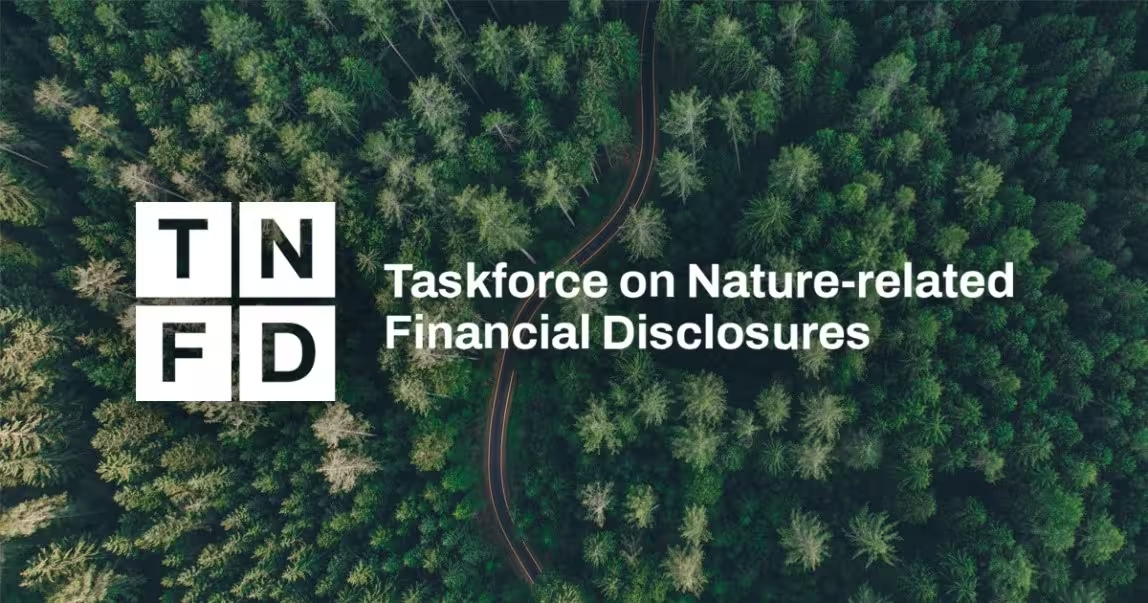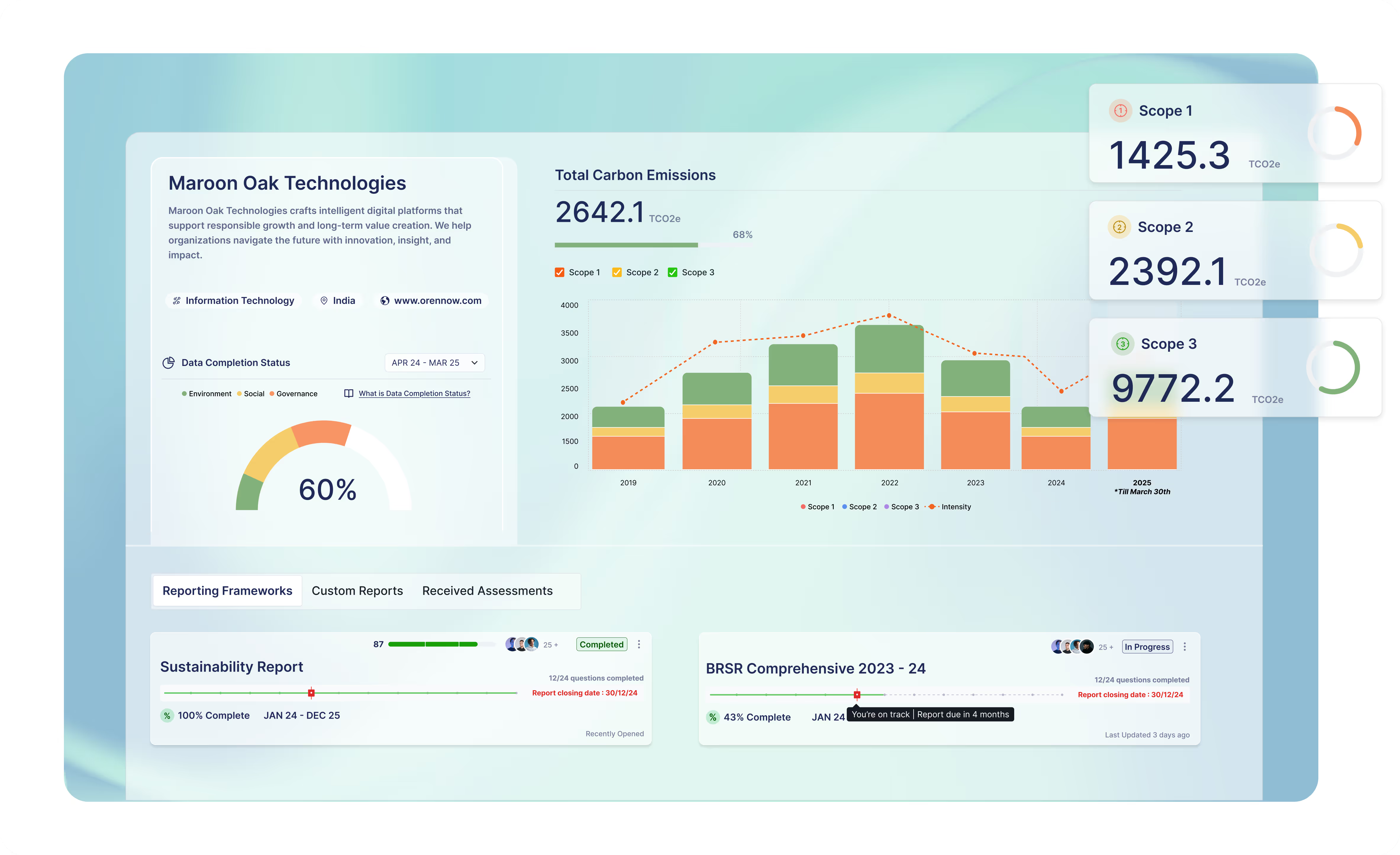Sustainability Reporting That Highlights Real World Impact
.avif)
What is Sustainability Reporting?
Sustainability reporting is the process through which a company shares information about its environmental, social, and governance (ESG) practices. It helps communicate how the business is managing its impact and the steps it is taking toward responsible development.
Numbers, charts, infographics, and narratives are usually present in such reports to display progress, challenges, and future targets. Companies often follow recognised sustainability reporting standards and frameworks for proper clarity and comparability.
Therefore, with the help of sustainability reporting, stakeholders can understand a company’s long-term value and support ESG goals.
Why Sustainability Reporting Matters
Companies that aim to build trust and show accountability need this reporting. When they become transparent in sharing ESG practices and impacts, their brand reputation improves. This attracts investors, customers and partners who also gain an understanding of how responsible they are in their operations.
ESG risk identification becomes another important reason. There is a proper responsibility to consider risks such as supply chain vulnerabilities or regulatory challenges. Therefore, companies have ample opportunities to reduce waste and lower costs.
Corporate sustainability reporting strengthens competitive positioning. It:
- Demonstrates leadership in responsibility
- Provides operational insights
- Supports strategic decisions
- Aligns business activities with long-term sustainability goals
What are the Various Sustainability Reporting Frameworks
There are globally recognised frameworks and standards for clarity, comparability, and credibility purposes. Companies receive proper guidance in structuring their reports and disclosing ESG performance in a way that stakeholders can trust through these frameworks.
- The Global Reporting Initiative (GRI): Many companies worldwide adopt it. It helps companies report environmental, social, and governance impacts for a broad stakeholder audience.
- European Sustainability Reporting Standards (ESRS): This one aligns with the EU’s Corporate Sustainability Reporting Directive (CSRD). This framework defines required disclosures for climate, biodiversity, workforce, and business conduct.
- ISSB’s IFRS S1 & S2: IFRS S1 sets the requirements for general sustainability-related financial disclosures, while IFRS S2 focuses on climate-related financial disclosures. It helps companies provide consistent and decision-useful information to investors.
- CDP (Carbon Disclosure Project): It enables reporting on climate impacts and emissions. Additionally, it also provides reports on water use and deforestation.
- Business Responsibility and Sustainability Report (BRSR): Introduced by SEBI (Securities and Exchange Board of India). The BRSR is a mandatory sustainability reporting framework that integrates business responsibility with sustainability. It encourages companies to disclose ESG performance in a structured, standardised format.
What Should a Sustainability Report Contain?
There are no fixed components in particular or any specific format. An effective report is there to communicate ESG goals, actions taken, results achieved, and plans for continuous improvement. It may also include financial aspects that intersect with sustainability initiatives, offering a holistic view of performance and impact.
Common Components of a Sustainability Report:
| Component | Purpose |
|---|---|
| Materiality Topics | Highlights ESG topics that matter most to the business and stakeholders |
| Governance and Accountability | Shows oversight structures, decision-making processes, and stakeholder engagement |
| Narratives and Strategy | Explains sustainability goals, actions taken, and progress toward targets |
| ESG Metrics and KPIs | Provides measurable data on emissions, water use, diversity, supply chain, and other impacts |
| Third-party Assurance | Verifies data independently to enhance trust and credibility |
These elements help companies present structured and reliable information to investors, employees, regulators, and partners.
How Sustainability Reporting Supports ESG Goals
Companies rely on sustainability reporting because it turns ESG objectives into actionable insights for them. So, businesses can:
- Track key metrics
- Evaluate progress
- Make data-driven decisions that align with long-term goals
All of it, through the company's sustainability report preparation.
For instance, a bank aiming to improve financial inclusion and reduce its environmental impact can use a bank’s sustainability report to track energy use across branches, monitor community programs, and report on responsible lending practices. A well-structured report highlights these initiatives and shows measurable progress over time.
This process supports initiatives like ethical sourcing and employee diversity. Community engagement is also a result of such responsible reporting.
Therefore, sustainability reporting enables companies to integrate ESG into operations and meet stakeholder expectations. Sustainability reporting practices also help them to drive measurable progress toward their responsible targets.
Common Challenges in Sustainability Reporting
Creating a sustainability report presents several hurdles, especially for companies starting their ESG journey:
- Resource Intensity: Reporting can demand significant time, effort, and costs, particularly if done manually.
- Data Complexity: Collecting, validating, and consolidating ESG information across departments and supply chains is often a challenging task.
- Lack of Standardisation: Different frameworks and reporting practices make it harder to benchmark performance and ensure consistency.
- Evolving Regulations: Constantly changing rules and disclosure requirements require companies to stay agile and compliant.
How to Overcome These Challenges:
- Implement robust data management systems to efficiently track ESG performance.
- Engage stakeholders to ensure reports are meaningful and relevant.
- Stay updated on regulatory changes and provide team training as needed.
- Use specialised sustainability reporting platforms to produce transparent, high-quality company sustainability reports.
Trends Shaping the Future of Sustainability Reporting
Companies aim for greater consistency and strategic insight. Organisations are moving beyond compliance to adopt more forward-looking sustainability disclosures that emphasise future risks, scenario planning, and science-based targets.
Digital transformation is a key trend, with businesses shifting from static PDFs to interactive dashboards. AI and automation are increasingly used to collect, analyse, and present ESG data, making company sustainability reports more accurate and real-time.
There is also a push toward convergence of standards, such as ISSB initiatives, to simplify reporting frameworks globally. Integrated reporting, combining sustainability and financial performance, is gaining traction to provide a holistic view of business value.
Finally, enhanced assurance and auditability are becoming essential, as stakeholders demand verifiable, transparent, and traceable ESG disclosures. These sustainability reporting trends are shaping how sustainability reporting in India and globally delivers meaningful insights for investors and stakeholders alike.
Conclusion
Now we know that numbers are not the only thing companies look for when it comes to sustainability reports. They do wish to learn the reports’ impact and share it meaningfully. Oren helps businesses to:
- Understand the meaning of sustainability reporting
- Streamline their processes
- Turn their ESG data into insights
We are among the top sustainability reporting companies in Asia - here to help you understand your impact and take meaningful action.
Frequently Asked Questions
Is ESG and sustainability reporting the same?
No. ESG refers to environmental, social, and governance factors, while sustainability reporting is the process of disclosing how a company performs on those ESG aspects.
What should a sustainability report include?
A report typically contains ESG goals, metrics, narratives, governance details, and third-party assurance to show progress and credibility.
Why is sustainability reporting important for businesses?
It improves transparency, builds stakeholder trust, highlights risks and opportunities, and aligns business operations with ESG goals.
How often should companies publish sustainability reports?
Most companies prepare an annual sustainability report, though some may publish quarterly updates or ad hoc disclosures depending on regulatory and stakeholder requirements





